

In this Newsletter we will be telling you of the latest happenings of the Transputer Initiative, the revised membership of the Computing Facilities Committee (CFC) of the SERC Engineering Board, and giving you a portrait of CFC's new Chairman, Professor John Douce. We will also be asking for your comments and suggestions for an Engineering Computing Group Open Day, to be held at RAL in March next year.
It is hoped that AI Support for engineers will be a regular column of the Newsletter, and this month, there is an initial breakdown of the results of the AI Support Questionnaire sent out with the last issue.
Another departure from Rutherford Appleton Laboratory for pastures new is Dr Cliff Pavelin, who worked in Informatics Division. A resume is included on the work that Cliff has done over the years. A brief article on the Arpanet Gateway Service has been written by Dr Cooper, the Head of JNT and Network Executive, which many of you will find informative.
The first year of publication of this Newsletter has been very eventful and, I hope, will continue to be so. I would like to take this opportunity of thanking everyone who has contributed in any way to the Newsletter, but especially to those of you who send in contributions.
John Douce held positions as lecturer, senior lecturer and reader in the Electrical Engineering Department, Queen's University, Belfast, during the period 1958 to 1965, moving to Warwick University as Professor of Electrical Science in 1965, arriving one week before the first undergraduates. He has been chairman of the Engineering Department (1980 to 1983) and of the Faculty of Science (1984 to 1987).
He is currently a member of the University Grants Committee (UGC) Technology Sub-committee, serving on the Computer Aided Design teaching initiative management committee and the UGC/Computer Board group on computing facilities for teaching.
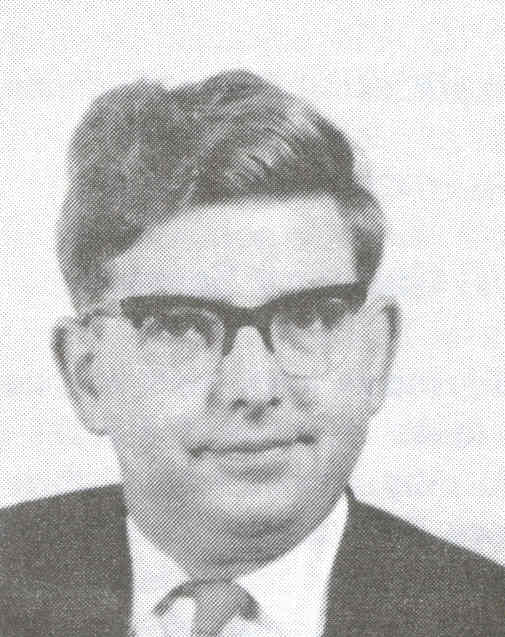
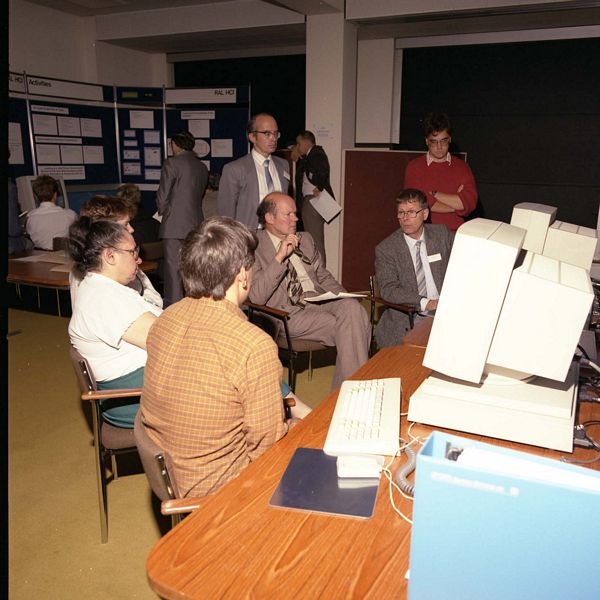
Professor Douce is the author or co-author of over 70 papers and a textbook on control systems analysis, the more recent publications being concerned with spectral analysis and frequency response estimation techniques using short-duration records.
His computing experience began with machine code programming of the first Ferranti machine at Manchester University, to evaluate the dual-input describing function. More recently, he has been an extensive user of the Prime 750 at Warwick University to develop data analysis facilities, and of the applications of Sun systems to control engineering research.
All SERC Committee members serve for a fixed period of time, normally 3 years. Changes in membership occur at the start of each academic session (i.e. October). The revised Computing Facilities Committee membership from October 1987 is as follows (* denotes new member of the Committee):
Special arrangements have been negotiated to enable the service to be maintained for the period to 31 March 1988. Any service beyond then is dependent on satisfactory financial arrangements being agreed by the various funding bodies involved. It should be noted that a major cause of the problems which resulted in the latest crisis was the growing amount of traffic that was not authorised by the funding bodies.
The major item to report since the last Newsletter is the decision on the location of the National and Regional Support Centres. A short list was drawn up from the 23 bids received and each of the short-listed sites was visited to enable detailed discussions to take place. The final selection was made following these visits and is as follows:
All these Centres began operation on 1 October 1987.
The Interim Centre at Rutherford Appleton Laboratory will continue to operate and provide Regional Centre facilities for the Midlands and the South-East until such time that a suitable centre for the region can be identified.
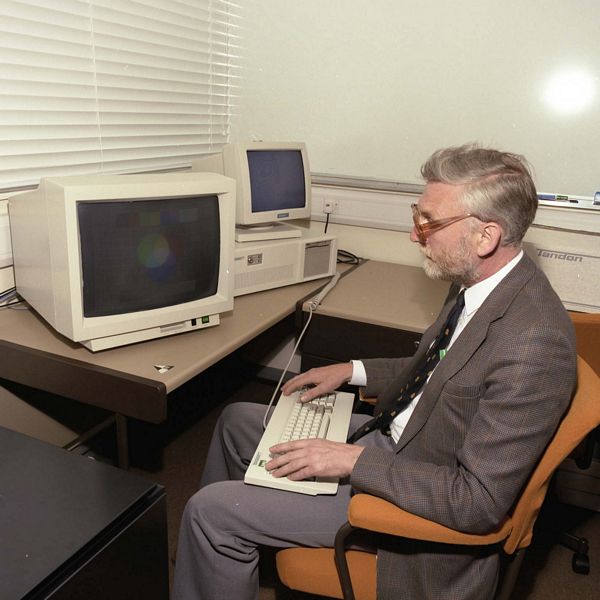
Applications for Loan Pool hardware and software continue to be received. A total of 55 loans have now been approved from 70 applications received With the establishment of the Support Centres, successful applications from people based where a Centre is located will normally be directed to use the facilities offered by the Centre. The Loan Pool is close to being fully committed, but the return of some of the first batch of loans on 1 November 1987 will ensure that future applications can be dealt with. If you plan applying for a loan, can I please encourage you to get it in as soon as possible.
General interest in the Initiative continues to grow at a high rate and the mailing list has grown to well over 800. A mailshot is being sent out in the next two weeks (apologies for the delay) and if you are not on the mailing list and would like to receive a copy please contact me.
A two day Workshop has been arranged in Abingdon on 30 November and 1 December 1987 on Transputer Development Environments. Full details are included in the mailshot.
Cliff Pavelin left RAL after 16 years to take up an appointment with Active Memory Technology (AMT), the start-up company run by Dr Manning to market the mini-DAP.
Cliff always said that his life seemed to divide into periods of three years. Before joining the Atlas Computer Laboratory in 1971 he had spent 3 years getting a First Class Maths Degree at Cambridge followed by similar periods at English Electric (on compiler implementation), Edinburgh University doing a Ph D on improvement of program behaviour in a paged environment, and ICL (operating systems design).
At Atlas, he continued his 3-year cycles by spending the next period working on the recently installed 1906A providing Accounting and Budgeting software, a High Level Scheduler and many other utilities.
In 1975, when Atlas was merged with the Rutherford Laboratory, he soon became involved in the new Interactive Computing Facility. The plan initially was to have 3 large central interactive facilities with the multi user mini systems being installed later. Cliff was involved in the upgrading of the DECI0s at UMIST and Edinburgh and did most of the benchmarking for the third large system at Rutherford. Due to one of the many crises in SERC funding, the latter was never installed. His major claim to fame at this time was the inventing of the AU!
The next period up to 1978 was spent installing the set of PRIME systems which became the major part of the distributed computing power in the ICF. The Operating System PRIMOS was rather rudimentary in those days and a great deal of local modification was needed before it became acceptable to the user population.
In 1979, Cliff became acting project manager for STARLINK, a similar distributed system but based on VAX systems for use in image processing.
By 1982, he had taken over responsibility for all systems developments at RAL from IBM mainframes to minis. During this phase, he was largely responsible for the development plan which replaced the 360/195 systems by a 3081 and ATLAS 10 and the move from ELECTRIC/MVT to CMS/MVS.
In the last period of his career at RAL, he has been responsible for the Alvey activities mainly in the IKBS area but also MMI and SE for part of the time.
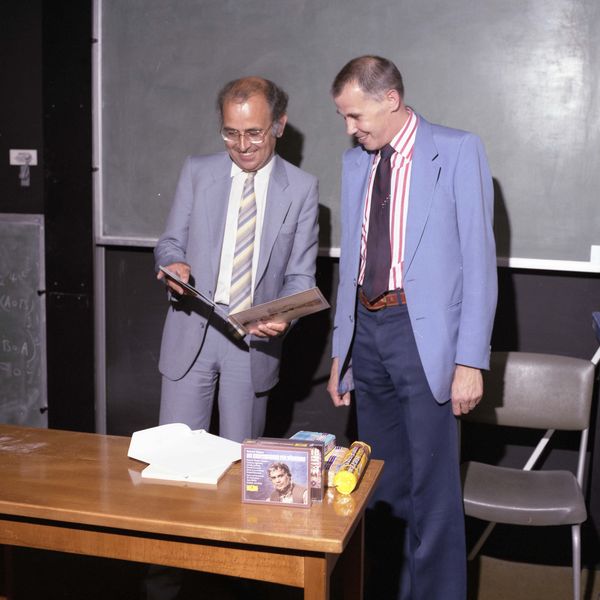
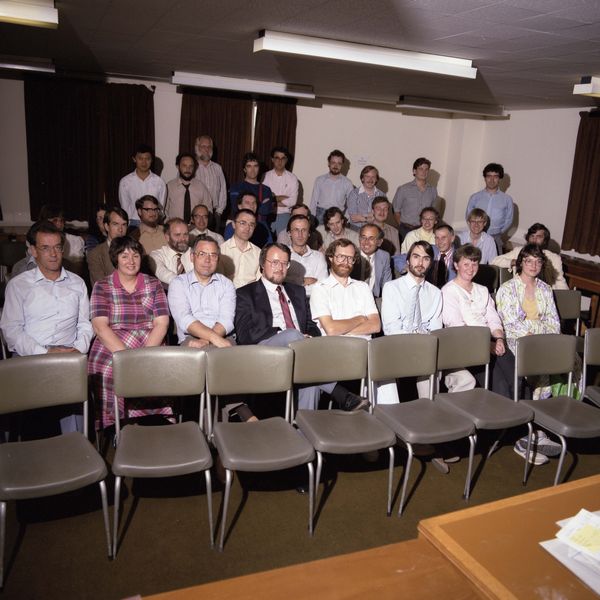
Over the years, Cliff Pavelin has been involved in many of the major computing developments at RAL. His departure will leave a gap that will be difficult if not impossible to fill. Everybody wishes him well in his new career.
The original implementation of RAL Graphical Kernel Standard (GKS) was of the Draft International Standard (DIS) version of GKS. In late 1986 plans were made to upgrade this to International Standard (IS) GKS in collaboration with the Computer Board GKS team who support RAL GKS (as GKS-UK) in the Universities. This culminated in a week of concentrated work at Ross Priory on the banks of Loch Lomond in January 1987. The week was successful and the nine participants produced a complete set of changes needed to bring RAL GKS up to the IS.
These changes were carried out by the GKS-UK Support Team and a joint period of testing followed. Around this time, the NCC GKS validation suite was issued on beta test. RAL became a beta test site and was able to test the validation suite and RAL GKS simultaneously. This was very useful, as it uncovered faults in both systems.
In July 1987, the new master source was complete and was distributed to other machines. This version is known as RAL GKS 1.00. RAL GKS now matches level 2b of the International Standard and implements what will become the International Standard Fortran binding. However, there are still a few shortcomings in some of the drivers, notably in the number of input classes supported.
Work has started on installing RAL GKS 1.00 on the ECF machines. The Prime library is about to be released and this will include a driver for the Printronix dot matrix printer. The SUN version is well under way and this release will include colour plus extra input devices. Central Computing Division are installing RAL GKS 1.00 on the central mainframes at RAL and on the Cray, and the GKS-UK Support Team will be releasing it on Computer Board machines.
RAL GKS is documented in the RAL GKS Guide. Work is under way to update this manual to the IS version, and replacement chapters will be sent to holders of the guide in due course.
The response to the questionnaire, distributed with the last issue of the Newsletter, has been very encouraging, but if you have not replied, it is still not too late to do so.
In case you have mislaid or lost the original form, the details requested include your name, address, reasons for using international networks, those actually used, details of grants funded by the Engineering Board and changes to future networking requirements.
Future support of these facilities will only be guaranteed if there is a clear requirement by the majority of the community.
We are proposing to hold two Open Days on the work of Engineering Computing in March 1988, at Rutherford Appleton Laboratory. One of the days will be for pupils from the local schools, and the other for anyone interested in, or involved in, the area of engineering computing. At this stage, we would welcome ideas from all readers of the Newsletter on what areas of the subject and/or demonstrations that should be included. More details will be given in the January - March 1988 issue of the Newsletter. Can you please let me know, by 20 November, of any suggestions, or if you would be interested in attending. Please remember - they are your Open Days!
A questionnaire was sent out with the last issue (Jul/Oct 1987) of the Engineering Computing Newsletter. This article reports the results of our preliminary analysis of the replies received so far (28 Aug) and outlines some of the actions that we intend to take in response.
Forty-four replies have been received, twenty three from engineering departments, fourteen from computer science and seven from industrial companies or other research establishments. Obviously the sample size is small, so the results can only be taken as indicative. We are very grateful to all who took the time to reply.
The questionnaire was designed to find out
Responses indicate the availability of a wide range of hardware systems. Those that were mentioned more than twice are tabulated in figure 1. In producing these figure, different operating systems and computer models have been ignored since there was insufficient information in the replies.
| System | Have | Preferred |
|---|---|---|
| Vax | 24 | 8 |
| IBM PC | 24 | 8 |
| Sun | 17 | 17 |
| Prime | 11 | |
| Apollo | 6 | 3 |
| Whitechapel MG 1 | 3 | 1 |
| Xerox workstation | 3 | 1 |
| ICL | 3 | |
| GEC | 3 |
Although the Vax is the most widely available computer, only eight people said that they preferred to use it for developing AI software, whereas many more people preferred Suns, especially those who already have access to them. It is also interesting to note that two replies just said that Unix engines were preferred.
The conventional languages that were mentioned most were, not surprisingly, Fortran, Pascal and C: 23, 18 and 16 times respectively.
Figure 2 gives the results for AI languages and tools
| System | Have | Would like |
|---|---|---|
| Prolog | 25 | |
| Lisp | 15 | 2 |
| Poplog | 7 | 2 |
| Smalltalk | 5 | |
| ML | 3 | |
| Savoir | 3 | |
| ESP Advisor | 3 | |
| KEE | 2 | 3 |
| Inference ART | 2 | 1 |
| Pop 11 | 2 | |
| LOOPS | 1 | 1 |
| APES | 1 | |
| Frame Engine | 1 | |
| Edinburgh Blackboard Shell | 1 | |
| Props2 | 1 | |
| Good PC Shells | 2 |
This would indicate that Prolog and Lisp are fairly widely available. The relatively large number of available Smalltalks is quite surprising. Although a lot of expert system shells are on the market, not many were mentioned. It is interesting to note that, besides PC based shells, people are now wanting advanced KBS development systems like Inference ART, KEE, LOOPS and Poplog.
Over 75% of the responders would like to participate in topical workshops on AI in engineering. As expected, the topics of interest were varied, with the three main strands being:
The interest shown in the different courses was:
The courses in advanced tools attracted the attention of both engineers and computer scientists; those who indicated an interest in the Introduction to Expert Systems, Prolog and Lisp were engineers. Despite many engineers have access to Prolog or Lisp, they would still like to attend training courses. Two further courses, Poplog and AI techniques, were suggested.
On the whole, the engineers seemed very interested in this area, indicating a desire to participate and a need for more information. Some were interested in developing courses in this area for their own students.
Some specific requests and suggestions were for:
To improve communication, there should be:
As we said earlier, we have found the replies very helpful. We hope they will enable us to tune our plans to meet your real needs.
An interesting comment was made in one of the replies:
I am concerned by the wide gap between the development systems available to most UK research engineers and what is described in many papers from the USA. If this gap cannot be closed by providing (expensive) systems then we should focus on the development techniques and methodologies that will enable the best productivity from lesser systems (e.g. PC based).
The general tenor of the replies indicates that we will have to cover the entire spectrum.
The replies indicate that a relatively small number of different systems are really available. Many of these (Vax, Sun, Prime) are Common Base machines. The odd one out is the IBM PC which is probably used because of its relatively low cost.
We have some access at present to VAX and Sun systems which are widely used by our colleagues. These systems are already well-known to us and are being closely monitored. The same is not true of IBM PC systems, to which we will pay considerably more attention in future.
Some interest was shown in parallel hardware for AI applications. We are now establishing a procedure and compiling documentation for people to enable them to access parallel hardware which is located in Edinburgh. More information will be available on this soon.
In accordance with the hardware findings we will specially examine AI languages and tools for the IBM PC.
In addition, though, it is essential that researchers in Britain should be given access to the more advanced AI tools. We have arranged to provide such access within the Knowledge Representation Systems Trials Laboratory (KRSTL) which has been established at AIAI to make these tools available to academia and industry for trials. One of the main services that KRSTL offers is the opportunity for an individual to use the advanced toolkits over a substantial period of time (2 to 12 weeks) for a trial project relevant to his/her work under the supervision of an experienced member of AIAI staff.
This service has been sponsored by the Computing Facilities Committee of Engineering Board for SERC research workers and grant holders. If you would like to trial one of the toolkits please contact us at the address given at the end of this article.
Similarly, for those working on either Alvey or SERC grants, Edinburgh Prolog and the Edinburgh Blackboard Shell are available free of charge from the Rutherford Appleton Laboratory.
We will continue to examine other AI tools; as we find them useful, we will try to make them available.
We are grateful to all who offered to give presentations. Potential speakers will be contacted as workshops are organised.
The first such workshop will be in the civil engineering domain, entitled The Way Forward. It will provide a forum for civil engineers to meet to discuss the potential of AI in civil engineering and to identify possible application areas. Already a number of people have shown specific interest in this workshop; if you have not already done so, please let us know as soon as possible if you are also interested. Details will be sent out shortly.
The following are known dates for courses:
Everybody who expressed an interest in either the Introduction to Prolog or Introduction to Advanced KBS Development Systems has already been sent an application form. We must point out that these introductions to Inference ART, KEE, Knowledge Craft and LOOPS are intended for reasonably experienced computer users who have a general background in AI. They provide sufficient tutorial material, both written and practical, to enable attendees to use the system that is of interest to them under supervision. Following a two day introduction, attendees are encouraged to stay and use the system on a trial project.
Dates for the Introduction to Expert Systems and the Lisp courses will be given later.
We too see the advantages of having a hot-line telephone number and an e-mail address. The number to ring is 031 225 4464 x208.
If you have any queries concerning any area of AI we will glad to hear from you. Although we might not be able to help you directly, we can usually provide useful pointers. We have started to compile two documents that were requested:
These documents are still in draft forms, but already contain about one and two hundred entries respectively.
We are considering the suggestion of setting up an electronic bulletin board to encourage engineers to broadcast and exchange information and ideas. We expect to have more news on this and other topics in the next issue.
At the beginning of the Interactive Computing Initiative nearly 10 years ago, all terminal equipment was provided from a common terminal pool. Since then, dramatic changes in the design, type, availability and cost of terminals has taken place. Where individuals having access to a personal terminal was exceptional, now this is standard and over the past two years, the 'ICF' terminal pool has been run down to 20% of its peak level. No capital provision has been awarded for four years and no further significant replacement or supply of terminals will take place from the pool. Within the next six months, ownership of all remaining terminals will be offered to the present users, who would have to assume responsibility, if necessary, for repair and replacement.